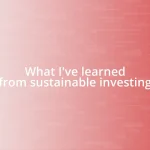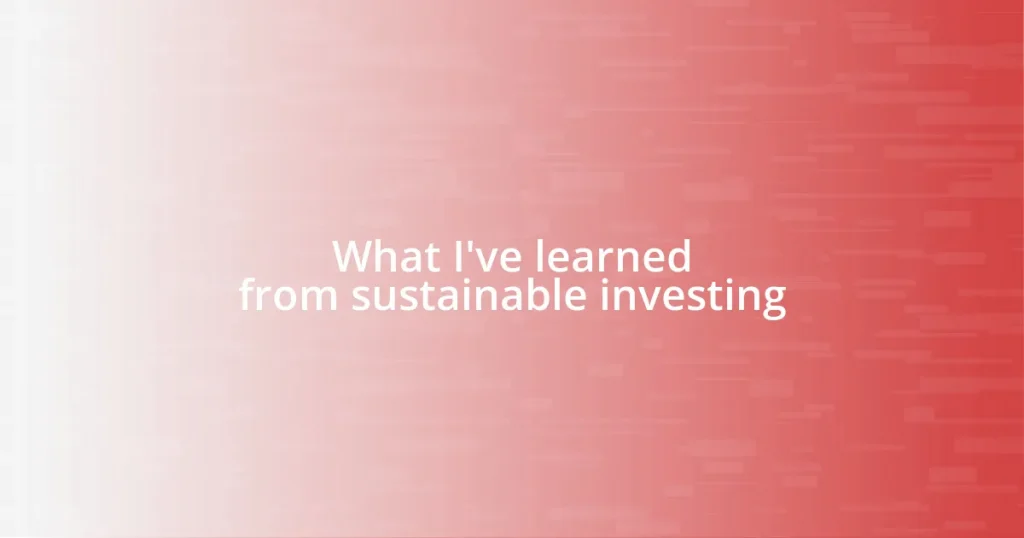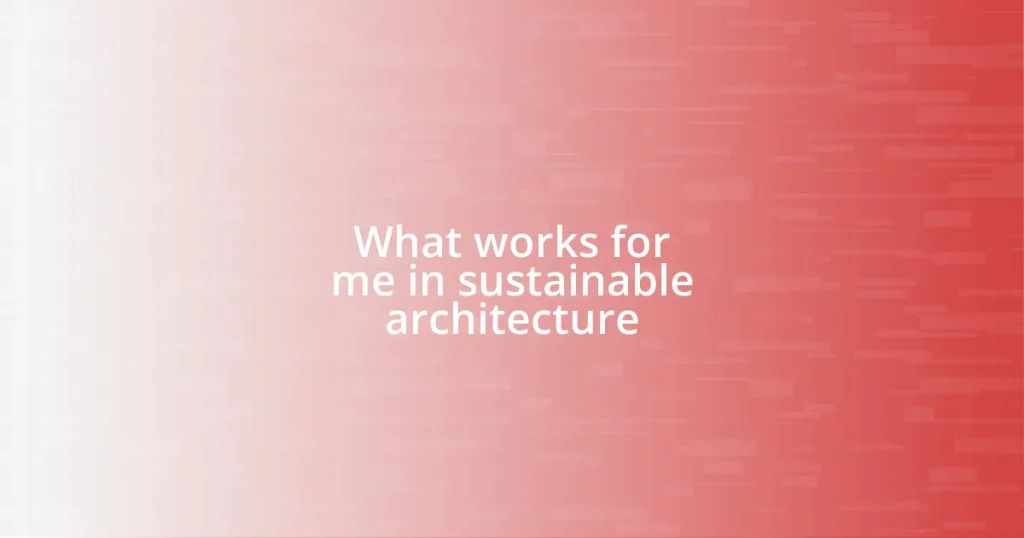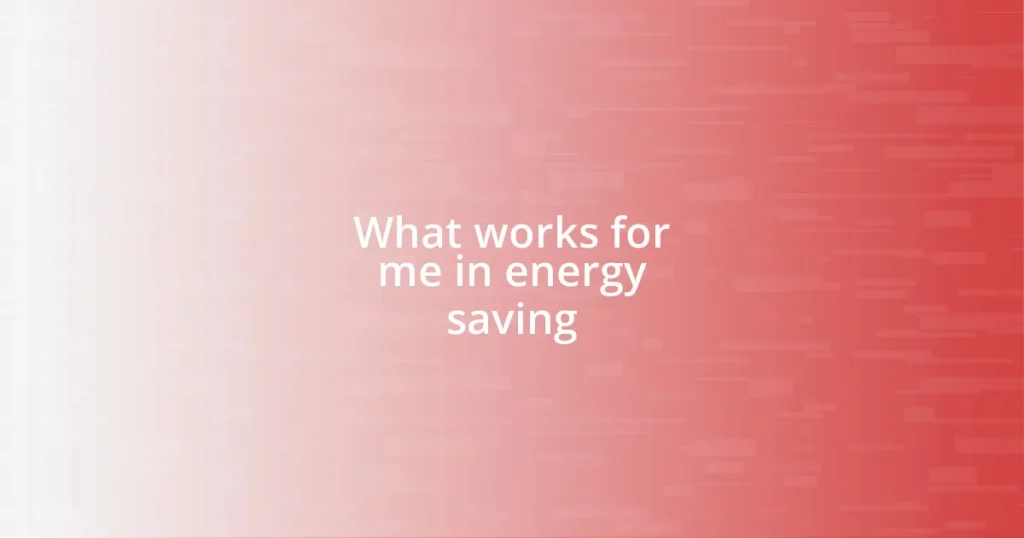Key takeaways:
- The energy auditing process includes reviewing energy usage data, conducting a physical inspection, and compiling a report with findings and recommendations.
- Energy auditors significantly improve energy efficiency and contribute to sustainability, leading to cost savings and environmental benefits.
- Qualifications for energy auditors include relevant degrees, technical knowledge, certifications, and practical experience.
- Maintaining certification involves continuous education, participation in industry events, and tracking professional achievements.

Understanding energy auditing process
The energy auditing process typically begins with a comprehensive review of a facility’s energy usage data. I remember the first time I sat down with a client’s utility bills; it felt like uncovering hidden treasures that revealed so much about their consumption patterns. Doesn’t it make you wonder how much we can learn just from numbers on a page?
Next, the auditor conducts a physical inspection of the facility, which is where the real magic happens. I found this part to be not just revealing, but exhilarating—walking through different spaces, looking at lighting, HVAC systems, and machinery. Have you ever noticed how little changes can lead to significant savings? It’s fascinating how the right adjustments can transform an entire system.
Finally, the auditor will compile a report summarizing findings and recommendations. There’s nothing quite like the satisfaction of presenting a plan that can potentially save a client thousands, isn’t there? I’ve felt the weight of responsibility and excitement during those meetings, knowing that practical steps are just around the corner for my clients to take towards enhanced efficiency.

Importance of energy auditors
Energy auditors play a crucial role in identifying opportunities for improving energy efficiency. I’ve seen firsthand how small tweaks can lead to massive cost savings. When I helped a manufacturing plant reduce their energy consumption by 30%, the joy on their faces was indescribable. Can you imagine the ripple effect this has—not just on their budget but also on the environment?
Moreover, energy auditors contribute to sustainability initiatives by providing tailored solutions that reduce greenhouse gas emissions. I recall one project where we optimized an office building’s energy usage, resulting in a significant reduction in their carbon footprint. It was rewarding to realize that my work was directly impacting the planet. Isn’t it fulfilling to think your profession can make a difference beyond just business?
Lastly, having certified energy auditors enhances credibility in the industry, ensuring clients receive expert advice. I often find myself in conversations about the value of credentials, and when I mention my certification, doors open. Clients appreciate that I not only understand the numbers but also the importance of implementing effective energy strategies. It’s like being handed a key that unlocks potential in every project I undertake.
| Role of Energy Auditors | Impact |
|---|---|
| Energy Efficiency | Identifying opportunities for savings and cost reduction |
| Sustainability | Reducing greenhouse gas emissions and promoting eco-friendly practices |
| Industry Credibility | Enhancing trust through certifications and expertise |

Initial qualifications for energy auditors
To embark on a journey as a certified energy auditor, certain qualifications lay the groundwork for success. I’ve often found that a strong educational background in engineering, environmental science, or a related field can really set you apart. These disciplines not only provide essential technical knowledge but also the analytical skills needed to assess energy usage effectively.
Here’s a quick overview of the initial qualifications that can pave the way for aspiring energy auditors:
- Educational Background: A degree in engineering, environmental science, or a related discipline.
- Technical Knowledge: Understanding of energy systems, building codes, and sustainability practices.
- Certifications: Initial certifications, like the Certified Energy Auditor (CEA) or Title IV certifications, can provide a competitive edge.
- Experience: Practical experience, whether through internships or fieldwork, gives hands-on insights into the auditing process.
Reflecting on my early days, I distinctly remember the significance of receiving my first certification. It felt like a rite of passage that validated the countless hours I dedicated to learning. Each study session was filled with a mix of excitement and anxiety, but I know that those moments were integral in forming a solid foundation for what would become a rewarding career. Without those qualifications, I wouldn’t have been equipped to tackle the challenges that come with the role. Trust me, it’s all worth it in the long run!

Training programs for energy auditing
Training programs for energy auditing offer a vital gateway into the field. I vividly remember attending my first workshop; the energy in the room was infectious. We were diving deep into real-world case studies, and it was fascinating to connect theory with practice. These programs not only provide valuable technical knowledge but also introduce you to industry standards and best practices.
Often, these training programs feature a blend of classroom instruction and on-site experience. I participated in a hands-on session where we assessed a local building, identifying inefficiencies in real time. That moment solidified my understanding of energy auditing; seeing concepts I had learned in lectures come alive was exhilarating. Isn’t it amazing how practical experience can crystalize learning?
Lastly, the network you build during these training sessions is invaluable. I’ve formed relationships with mentors and peers that have had a lasting impact on my career. These connections often lead to job opportunities or collaborations, which can enhance your growth in this dynamic field. Have you considered how much your network contributes to your journey? For me, these connections have been a lifeline in navigating my path as an energy auditor.

Certification requirements for energy auditors
Certification requirements for energy auditors can be quite specific, but they’re crucial for establishing credibility in the field. Generally, most certifying bodies require candidates to hold a relevant degree and gain a certain number of hours in the field. I still remember poring over my application, meticulously calculating all my relevant experience — it felt like a scavenger hunt of success.
One of the most notable certifications is the Certified Energy Auditor (CEA), which not only deepens technical knowledge but also shows potential employers dedication and expertise. When I finally received my CEA designation, the pride I felt was second to none. It validated all those late nights spent studying energy management principles that often felt overwhelming. Don’t underestimate that moment; it’s a significant milestone that can open many doors.
Experience plays an equally vital role in certification. Typically, candidates are required to log at least two years of practical work under a qualified professional. Reflecting on my own journey, I can’t stress how crucial those hands-on experiences were. They equipped me with the practical knowledge to approach audits with confidence. Have you thought about how real-world applications can change your perspective? For me, translating theory into practice was the turning point in my career.

Steps to maintain your certification
To maintain your certification as an energy auditor, I find that continuous education is essential. Most certifying organizations require professionals to complete a certain number of continuing education units (CEUs) every few years. I remember the excitement I felt when I enrolled in a new energy technology seminar; it reminded me that growth doesn’t stop with certification. How often do we overlook the value of staying updated? In my experience, new developments can radically change our approach to energy auditing.
Another crucial step is actively participating in industry conferences and workshops. I can’t emphasize enough how much I’ve learned from networking with others in the field during these events. One year at an annual conference, I stumbled upon a workshop about new energy regulation changes that could impact audits. That moment not only enhanced my understanding but also enabled me to adapt my practices promptly. Have you ever considered how these interactions can spark new ideas?
Lastly, keeping track of your professional achievements is a key aspect of maintaining your certification. Regularly updating your portfolio with completed projects, achievements, and new skills keeps your career growth transparent and organized. I often find myself reflecting on the projects I’ve completed and the skills I’ve acquired over time, and it’s both rewarding and motivating. How does tracking your progress inspire you? For me, it’s a tangible reminder of how far I’ve come and the journey still ahead.















